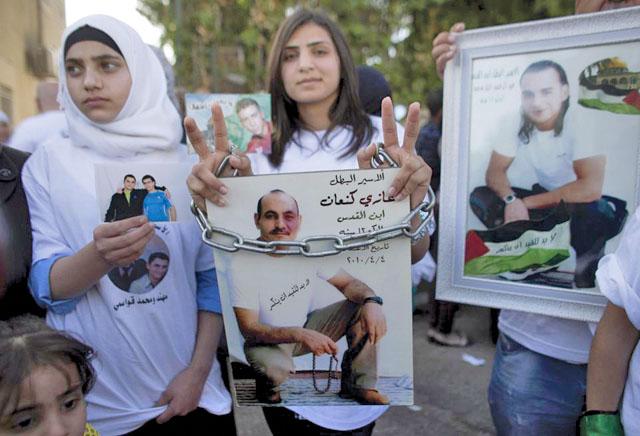You are here
Israeli, Palestinian NGOs petition EU on hunger strikers
By AFP - Jun 01,2014 - Last updated at Jun 01,2014

OCCUPIED JERUSALEM — Palestinian and Israeli rights groups on Sunday wrote to EU foreign policy chief Catherine Ashton demanding her “urgent intervention” on behalf of 125 prisoners on long-term hunger strike.
The letter was sent as the overall number of Palestinian prisoners refusing food climbed to 290, including 70 being treated in hospital, an Israel Prisons Service spokeswoman told AFP.
Of that number, 125 have been on hunger strike for more than five weeks, beginning their mass protest on or shortly after April 24, Palestinian rights groups say.
Most of the prisoners are administrative detainees who are refusing to eat in protest over their being held without trial in a procedure which can be extended indefinitely.
“We... wish to bring to your attention the ongoing mass hunger strike involving approximately 125 Palestinian detainees and prisoners, and request your urgent intervention on their behalf,” said the letter, signed by 17 rights groups and the Palestinian prisoners affairs ministry.
“As of June 1, the majority of the hunger strikers have gone without food for 38 days.
“We have reached a critical stage and unless there is immediate intervention there will be dire consequences for the health of all those on strike,” it said.
Among those refusing food are six parliamentarians from the Palestinian Legislative Council (PLC), all of whom are administrative detainees, the letter said. Palestinian officials said they had only recently joined the strike.
Many had stopped taking vitamins and were only drinking water, it said, accusing Israel of withholding salt from them for the first fortnight of their strike.
The IPS denied the allegation, with spokeswoman Sivan Weizman telling AFP the detainees had been given “everything as required by law”.
Hanan Ashrawi, a senior figure with the Palestine Liberation Organisation accused Israel of “systematically” using administrative detention as a tool for the collective punishment of Palestinians.
“We call on all states... to pressure Israel to drop its cruel and illegal use of the colonial practise of administrative detention and other administrative punitive measures,” she said in a statement.
Two years ago, more than 1,500 prisoners staged a four-week hunger strike which ended with a deal in which Israel agreed not to extend the prison terms of those in administrative detention unless fresh evidence against them emerged.
Israel also agreed to return those in solitary detention back to the general prison population as well as allowing a resumption of family visits for detainees who come from Gaza.
About 5,000 Palestinians are being held in Israeli prisons, nearly 200 of them under administrative detention orders, which allow suspects to be jailed without trial for up to six months.
Such orders can be renewed indefinitely by a military court.
Related Articles
Israel hospitalised 40 hunger-striking Palestinian detainees this week as their fast entered a second month, the spokeswoman of Israel’s prison authority said Tuesday. In all, some 240 detainees are currently on a hunger strike.
Dozens of Palestinian prisoners who had refused food for 62 days have suspended their hunger strike after reaching a deal with the Israel Prisons Service, their lawyer told AFP.
Stuck indefinitely in Israeli jails, Palestinian prisoners see starving themselves — to death if necessary — as their only choice in the face of archaic detention laws.















